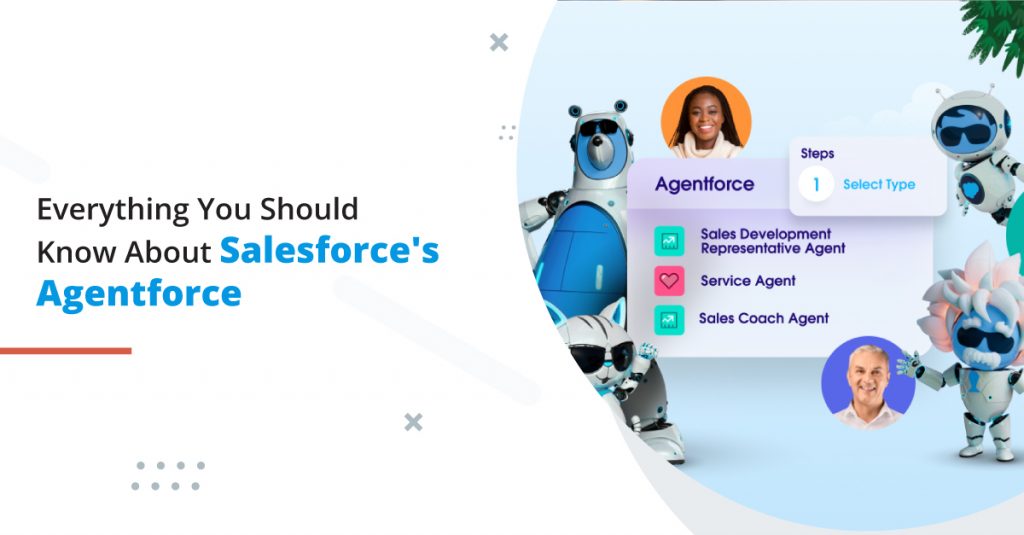This year’s Dreamforce was all about AI, but there was one thing that became the center of attention, Agentforce. Agentforce empowers organizations to create and manage autonomous agents for tasks across multiple business functions—essentially putting “Agentforce in every app.” This opens up opportunities to develop specialized agents for Sales, Service, Marketing, Commerce, and Platform operations. As trusted Salesforce consulting services, we are very excited for this new enhancement.
In this blog, we’ll be talking about Agentforce in detail, evaluating how exactly it works and how it is going to help users.
Salesforce’s Evolution Towards AI
Salesforce has been gradually rolling out its vision over the past few months, starting with the introduction of its Service Agent product, followed by the Sales Agent.
Salesforce has evolved from the Einstein product launched in 2016. Salesforce Einstein was majorly focused on predictive AI, which helps in analyzing past data to forecast future outcomes. Since then, the shift has moved from features like Lead Scoring and Opportunity Insights to generative AI, capable of producing text, images, videos, or audio from a simple prompt.
Salesforce believes the next leap in AI is through autonomous agents. With significant investment in AI, the world’s top tech companies are aiming to take productivity and business performance to new levels. While features like summarizing a Slack conversation are helpful, they won’t drive the massive economic impact that AI promises.
Salesforce’s new Sales & Service Agents are fully autonomous, operating around the clock to handle routine tasks that can be handed off to machines. The Service Agent takes current chatbots to the next level by enabling natural, full-fledged conversations rather than following limited, pre-programmed chat paths. It’s also multi-modal, meaning it can process and understand text, images, and videos, allowing for a more dynamic and engaging customer experience. The right Salesforce consulting services can help you work with Agentforce more efficiently.
What is Agentforce?
So, what exactly is this Agentforce that the Salesforce executive team kept highlighting during the earnings call? As expected, it’s the platform on which these autonomous agents are built. Like much of the Salesforce ecosystem, Agentforce provides ready-made solutions like Sales and Service agents while also enabling the creation of custom agents tailored to specific needs. Salesforce emphasizes that building these agents is simple—relying on clicks, not code. Attendees at the ‘Agentforce Launchpad‘ at Dreamforce echoed this, confirming that it really “works” and is as intuitive as promised.
How exactly does the process of building an agent work? We’ll walk through the key components that power an agent’s functionality, drawing insights from Dreamforce ’24.
1. Agent Description
Start building your agent in the Agent Builder within Agentforce Studio, where the configuration process begins. It’s all done using natural language—just like having a conversation with another person. As Salesforce puts it, “If you can describe it, Agentforce can do it.” The interface allows you to set the agent’s avatar, name, and description.
Channels refer to the platforms through which humans and agents interact, such as email, voice, WhatsApp, and more.
2. Agent Topics
Topics are the core building blocks that define what an agent can handle. Think of topics as categories of information—for instance, an order management topic would allow the agent to access order history and update product details. In the Dreamforce ‘24 keynote demo, the agent successfully addressed several customer queries, but some remained unresolved because the necessary topics weren’t assigned.
3. Topic Actions
In addition to topics, actions serve as another crucial component for agents. Actions are linked directly to the assigned topics. Adding extra actions available in your organization is straightforward—simply select the desired actions from the list that appears in the pop-up window.
4. Data Graphs
Data Graphs allow you to map out the relationships between data model objects (DMOs), even at multiple levels of depth. This visualization helps ensure that the right data is accessible when creating prompts or giving instructions to an Agentforce agent, which is essential for generating precise and effective results.
With real-time Data Graphs, faster identity resolution, segmentation, and actions are performed using ingested data, ensuring that everything is primed and ready for Agentforce to operate seamlessly.
There are many other features that you can access with the help of the right Salesforce consulting services.
Try Agentforce with Salesforce Consulting Services
There’s a lot more to Agentforce but to leverage all of its features, you would need to have a trusted Salesforce consultant working alongside you. Having the right support would help you leverage this latest feature the best way, enabling you to make the most of Agentforce to improve agent operations and productivity. Contact us and get reliable Salesforce professionals who can help you work with this latest Salesforce addition.
